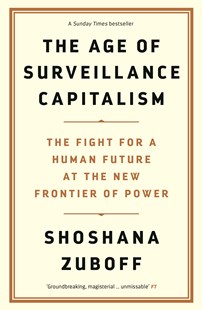A new book explores how corporate digital surveillance affects our lives.
Shoshana Zuboff’sThe Age of Surveillance Capitalism: The Fight for a Human Future at the New Frontier of Power (PublicAffairs, 2019), honored by The Financial Times and McKinsey as a short list Best Business Book of the Year 2019, has been placed by some in the canon of socioeconomic investigations: Adam Smith’s The Wealth of Nations, Max Weber’s Economy and Society, Rachel Carson’s Silent Spring and Karl Marx’s Das Kapital. “Everyone needs to read this book as an act of digital self-defense,” writes Naomi Klein, author of This Changes Everything.
Zuboff defines surveillance capitalism as “a new economic order that claims human experience as free raw material for hidden commercial practices of extraction, prediction and sales…” It is a profound book, building its judgments regarding surveillance on foundations of fundamental, timeless societal issues: the individual versus the collective, the right to sanctuary, the right to one’s future, and the difficulties posed by power asymmetries between large corporations and the consumer-public.
Surveillance capitalism is enabled, and conducted, by the “big four” (Google, Facebook, Amazon and Apple, expanded to the “big five,” to include Microsoft), and technology companies that have created digital platforms for communications, including market transactions. Zuboff credits Google with creating data scraping from consumer transactions, made possible by the invention of browser “cookies” by an engineer at Netscape.
Most of us see Big Tech companies’ surveillance as merely a privacy issue. Perhaps we are comfortable with a naïve view we have “nothing to hide” or are happy with the trade-off that our web searches are free on this wonderful thing called the internet. A search for golf equipment results in a machine placing us among “people who golf.” Our life is made easier because we now see ads for golf gear, but not tennis gear. What could be wrong with that?
For starters, digital surveillance is now everywhere and becoming more intrusive. For example, “wearable tech” can help diagnose and control the spread of COVID-19. New sensors will measure multiple body functions and proximity to others, enabling social distance monitoring and contact tracing. This data will be permanently stored. It will be collated with location data, product searches and receipts, creating thousands of data points generated by our functions and activities. Algorithms will sort, categorize, predict behavior and, ultimately, influence our behavior to accomplish the ends desired by “advertisers.”
Who Owns Your Information?
 Zuboff identifies the real customers of the surveillance companies as the advertisers and other companies that utilize the data created in the course of the transactions by the users — we who think of ourselves as the “customers” of Google, Facebook, Amazon, Apple, Microsoft and other digital platforms. Indeed, each of these companies creates “value added” for the users who engage in the transactions, giving rise to our scraped data: with Google, it is searches; with Facebook, it is facilitated social connections; Amazon, purchases shipped to our homes or steamed videos; and so on. Zuboff illustrates how Big Tech companies have boldly laid claim to the behavioral data of our everyday lives. She outlines several stages and tactics to cast light on these companies’ tactics, including dispossessing users of their data, habituating users to constant data extraction, deflecting objections and lobbying extensively to preserve their business model. At the heart of this issue is, who owns your information? Big Tech has laid claim to the data by arguing that because they collect, aggregate and analyze our data, they own it.
Zuboff identifies the real customers of the surveillance companies as the advertisers and other companies that utilize the data created in the course of the transactions by the users — we who think of ourselves as the “customers” of Google, Facebook, Amazon, Apple, Microsoft and other digital platforms. Indeed, each of these companies creates “value added” for the users who engage in the transactions, giving rise to our scraped data: with Google, it is searches; with Facebook, it is facilitated social connections; Amazon, purchases shipped to our homes or steamed videos; and so on. Zuboff illustrates how Big Tech companies have boldly laid claim to the behavioral data of our everyday lives. She outlines several stages and tactics to cast light on these companies’ tactics, including dispossessing users of their data, habituating users to constant data extraction, deflecting objections and lobbying extensively to preserve their business model. At the heart of this issue is, who owns your information? Big Tech has laid claim to the data by arguing that because they collect, aggregate and analyze our data, they own it.
Behavioral Futures Markets
Surveillance capitalism originated in a virtuous cycle, the use of data for product and service improvement and the personalization and customization of user experience. These are fundamental principles taught in business schools. Google added experimentation into its data collection and created predictive models of behavior. This scraped data has been used to create what Zuboff identifies as “behavioral futures markets.” The digital companies’ machines do not care who buys the prediction product.
It can only get worse: Greater predictability means greater “efficiency” of marketing dollars. Achieving greater predictability is accomplished by ever-larger files of data collated through ever more sophisticated predictive algorithms. And prediction can lead to behavioral influence or control. We may see a purveyor of golf gear as benign, but a political “influencer” may not be. Facebook-Cambridge Analytica provides a cogent example. Data collection and modeling by a Facebook client led to the identification of “persuadables.” Cambridge Analytica allegedly implemented its models of prediction and control by developing the “Do So” campaign on behalf of protagonists in the 2015 general elections in Trinidad and Tobago.
Another issue is the explosion of disinformation. Zuboff shows how this, too, has its roots in the digital platforms’ algorithmic processing of user data. Surveillance collection and prediction have no dependency on truth or fact. User “click-through” rates, “likes” and “retweets” are generated by disinformation just as easily as by truthful or factual information. The algorithms’ predictive success is just as effective, regardless of the quality of the content under circulation. Those who would sow disinformation to harm our society know this. Nonetheless, the imperative surveillance grinds on, sorting and collating users for targeting, fertile for sensational reactions, be they based on fact or fiction.
Regarding the massive assembly of a dossier on every member of our population, Zuboff asks, “Who knows? Who decides? Who decides who decides?” We would recoil instantly if the answers given to these questions were, “The government knows. The government decides it is entitled to decide, and the government does indeed decide,” resonating in George Orwell’s dystopian 1984. But because this surveillance is conducted by “successful” companies led by “farsighted, prosperous geniuses,” we are blind to the outrage and violation of our rights. Zuboff’s book removes the blind spot. She quotes Thomas Paine’s The Rights of Man, “a body of men holding themselves accountable to nobody, ought not to be trusted by anybody.”
Regulatory Approaches
Regulators in the United States are now addressing the role of the “big four” in terms of new approaches to antitrust. Google has been sued by the U.S. Department of Justice for violations of antitrust law. And the CEOs of Facebook, Apple, Amazon and Alphabet (Google’s parent) are currently undergoing congressional investigation. Regulators in the European Union are ahead of the U.S. in terms of addressing privacy concerns and have recognized and protected the “right to be forgotten.” The right to be forgotten implies that we own, or co-own, our scraped data and can exert some control over it. Europe’s EU General Data Protection Regulation, grounded in the right to privacy recognized in the 1950 European Convention on Human Rights, maintains that people own their information, and it creates obligations and limitations on the part of the agencies who collect and use individuals’ personal data, and protects its security.
U.S. law currently does not offer an answer, but it does not have to be so. Tim Wu, who is a leading thinker about new models of antitrust and who authored The Curse of Bigness: Antitrust in the New Gilded Age, suggests that privacy laws are an inadequate approach. Wu urges that the U.S. Congress pass anti-surveillance laws, which prohibit the “gratuitous surveillance and the reckless accumulation of personalized data … by allowing only the collection of data necessary to the task at hand … and after collecting data, firms would be forced … to get rid of it, or fully anonymize the rest of it.”
Zuboff writes, “What is at stake here is the human expectation of sovereignty over one’s own life and authorship of one’s own experience … the inward experience from which we form the will to will and the public spaces to act on that will.” The book will be invaluable to anyone seeking to sort out Big Tech issues: privacy, antitrust and the explosion of political disinformation.
By raising the alarm, Shoshana Zuboff invites us to consider, engage and debate the economic forms and institutions we are currently developing and their consequences. As servant leaders, we are challenged to address the problems that Zuboff identifies. Robert Reich, author of The Work of Nations, has differentiated knowledge workers, whom he calls “symbolic analysts,” as problem identifiers and problem solvers; and “strategic brokers” who connect problem identifiers with problem solvers. Having identified the problem, Zuboff invites us to fashion solutions to the problems she identifies.








